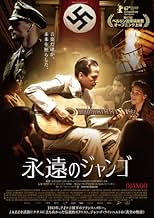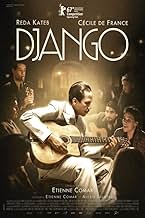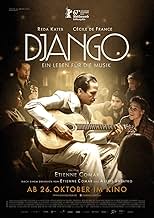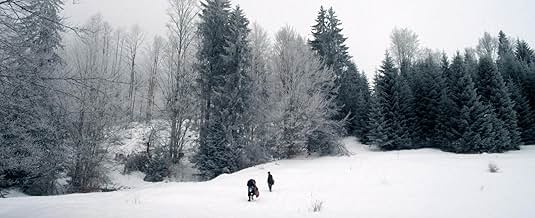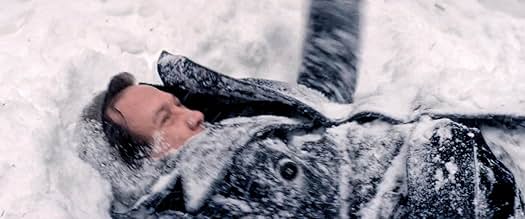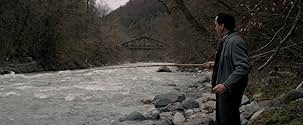VALUTAZIONE IMDb
6,4/10
2149
LA TUA VALUTAZIONE
La storia di Django Reinhardt, famoso chitarrista e compositore, e della sua fuga da Parigi durante l'occupazione tedesca, nel 1943.La storia di Django Reinhardt, famoso chitarrista e compositore, e della sua fuga da Parigi durante l'occupazione tedesca, nel 1943.La storia di Django Reinhardt, famoso chitarrista e compositore, e della sua fuga da Parigi durante l'occupazione tedesca, nel 1943.
- Premi
- 5 candidature totali
Cécile de France
- Louise de Klerk
- (as Cécile De France)
Bea Palya
- Naguine Reinhardt
- (as Beata Palya)
Gabriel Mirété
- Lévêque
- (as Gabriel Mireté)
- …
Etienne Timbo Mehrstein
- Timbo Hoffman
- (as Etienne Mehrstein)
Recensioni in evidenza
Solid biopic of a short period of Django's life during WWII. Acting OK, photography is very good, plot is OK but the music and the onscreen playing thereof is masterful.
The opening film of the Berlinale competition is yet another take on the sufferings brought on by the second World War. In a mixture of biopic and historical drama, Django fails in standing out from the crowd, walking down the one- dimensional route of escape from Nazi persecution, while rendering its characters secondary.
Django Reinhardt, a guitarist of Romani ethnicity, is dazzling the crowds in Paris during the later days of the German occupation. The specter of deportation looms over his family, his band, yet he refuses to accept the idea that anyone would harm him, due to his positive notoriety. However, after declining to tour in Germany, a quick visit to a local police station makes him see the light, as he flees close to the Swiss border, awaiting transfer. There, he comes across a local Romani camp and they come together to perform music in the area, as a means for survival. That's pretty much the gist of the story, which is as bland as it sounds. After a great opening scene, followed by an equally impressive musical performance, the movie drifts into this grey area where not much happens. Reda Kateb's performance is strong enough to retain some interest, yet the production lingers without delving deeply into either Django's person, nor the plight of the Romani people. Whenever music starts playing, the film comes to life, but this is not sufficient to keep a rhythm.
It's a shame, really, because there are glances of why Reinhardt could have been a relevant leading figure. Being unable to read or write, and bearing a childhood injury on his playing hand,his performances come from a deeply rooted passion for music, seemingly instilled by his Romani heritage and culture. This generates the contrast of music from the heart and music from the head, which is not subtle, yet it plays well with how ridiculously rigurous and lifeless Nazi censorship was. The close knit relations with his family, band and the fellow survivors he meets at the Swiss camp are well shaded against Reinhardt's privileged position, and his sense of entitlement. Yet, there is no clear sense of inner conflict, although the movie does imply that his personal quest is to learn some self sacrifice, putting himself second.
This is part of the problem, that Django just can't set itself apart and come across without conviction. Supporting characters have little to no personality, and function as either plot enhancers, or easy to swap band members. Only the relationship between Reinhardt and his mother is distinguishing, even if it feels at times like comic relief. The generic portrayal of the Nazi oppressors doesn't help either, as is the case with some of the elliptical moments in the story. Even the name of the movie should have given pause for thought: how does one make something distinctive with such an overused title?
Django would have been a much better experience, had it stuck to its music, especially as some of the artist's work was lost, which is a cause for grief. As another survival movie from the war, it falls flat, especially compared to some of the previously released hard-hitting productions, be they grim or soulful representations of the horror.
Django Reinhardt, a guitarist of Romani ethnicity, is dazzling the crowds in Paris during the later days of the German occupation. The specter of deportation looms over his family, his band, yet he refuses to accept the idea that anyone would harm him, due to his positive notoriety. However, after declining to tour in Germany, a quick visit to a local police station makes him see the light, as he flees close to the Swiss border, awaiting transfer. There, he comes across a local Romani camp and they come together to perform music in the area, as a means for survival. That's pretty much the gist of the story, which is as bland as it sounds. After a great opening scene, followed by an equally impressive musical performance, the movie drifts into this grey area where not much happens. Reda Kateb's performance is strong enough to retain some interest, yet the production lingers without delving deeply into either Django's person, nor the plight of the Romani people. Whenever music starts playing, the film comes to life, but this is not sufficient to keep a rhythm.
It's a shame, really, because there are glances of why Reinhardt could have been a relevant leading figure. Being unable to read or write, and bearing a childhood injury on his playing hand,his performances come from a deeply rooted passion for music, seemingly instilled by his Romani heritage and culture. This generates the contrast of music from the heart and music from the head, which is not subtle, yet it plays well with how ridiculously rigurous and lifeless Nazi censorship was. The close knit relations with his family, band and the fellow survivors he meets at the Swiss camp are well shaded against Reinhardt's privileged position, and his sense of entitlement. Yet, there is no clear sense of inner conflict, although the movie does imply that his personal quest is to learn some self sacrifice, putting himself second.
This is part of the problem, that Django just can't set itself apart and come across without conviction. Supporting characters have little to no personality, and function as either plot enhancers, or easy to swap band members. Only the relationship between Reinhardt and his mother is distinguishing, even if it feels at times like comic relief. The generic portrayal of the Nazi oppressors doesn't help either, as is the case with some of the elliptical moments in the story. Even the name of the movie should have given pause for thought: how does one make something distinctive with such an overused title?
Django would have been a much better experience, had it stuck to its music, especially as some of the artist's work was lost, which is a cause for grief. As another survival movie from the war, it falls flat, especially compared to some of the previously released hard-hitting productions, be they grim or soulful representations of the horror.
A splendid gripping film, released on the day we Dutch honor all those who have fallen during the 2nd World War. The captivating acting and the way in which the film was shot, immerses you in and meanders you along a distressing part of Django Reinhardt's life. The spellbinding music in the film, paying homage to Django Reinhardt's innovative jazz with an infusing Gypsy flavor, will stay with you for the rest of your life. And if you ever have the good fortune to visit the chapel of Saint-Pierre in Villefrance-sur- Mer (France) and look at the details of the wall paintings by Jean Cocteau, you will realize what a big impact Django has made on lots of people.
Django. Director/Writer Etienne Comar (primarily a Producer "Of God and Men" 2010) brings forth yet another amazing untold story about the German occupancy, this time set in Paris. This poignant music filled production chronicles the life of gypsy musician Django Reinhardt (Red Kateb "Zero Dark Thirty" 2012). When Django (who became a renown European Jazz and Gypsy Swing aficionado) and his band "Hot Quintet" is hired to entertain Nazi's in Germany, at a time when Jazz, the Blues and certain percussion instruments and musical beats were forbidden, the event turns hostile and soon his family and friends are forbidden to live their encampment, the young are forced to join the resistance, and soon he flees for his life. Comar starts the film with camera work that is too jumpy and too close to its characters to understand what and why things are happening. However, once he abandons this format, and steps back and establishes the environment (beautiful cinematography by Christophe Beaucarne) and begins to tell the story, the film gains its footing and never lets go. The musical presentation (music by Warren Ellis) in this film, especially the final concert, are mesmerizing and not to be missed. I don't know if Kateb actually performed the various guitar arrangements, but if he did, his performance is to be rewarded. Supporting Django in a successful minor role is his wife Naguine (Bea Playa), his mother Negros (Bombay Merstein) with her spirited personality, his resistance lover Louise de Klerk (Cecile De France) and his various bandmates. I have to say, I was not initially sold on this film. However, when the story of survival presented itself, set against the beautiful music and harsh realities of the WWII Nazi occupancy, I couldn't help but become fully invested in the presentation. This film was screened at the Palm Springs International Film Festival #PSIFF2018
It is more than a beautiful film. It represents a testimony, in so many senses, about the architecture of a period, about the identity of a comunity, about selfishness transformed in compassion and love for the others, about roots of Gypsy Swing and about essence of beauty, vocation and survive.
A film about family and, off course, about identity.
One of the impressive ones. A gem, in fact, for the message, first, for the wise manner to explore a very sensitive, today to, subject, not less. And admirable music.
A film about family and, off course, about identity.
One of the impressive ones. A gem, in fact, for the message, first, for the wise manner to explore a very sensitive, today to, subject, not less. And admirable music.
Lo sapevi?
- QuizAll music played by the incredible Dutch Rosenberg Trio
- ConnessioniFeatures Hoch der Lambeth Valk (1941)
- Colonne sonoreNuages
Music by Django Reinhardt
I più visti
Accedi per valutare e creare un elenco di titoli salvati per ottenere consigli personalizzati
- How long is Django?Powered by Alexa
Dettagli
Botteghino
- Budget
- 8.804.249 € (previsto)
- Lordo Stati Uniti e Canada
- 56.556 USD
- Fine settimana di apertura Stati Uniti e Canada
- 11.722 USD
- 7 gen 2018
- Lordo in tutto il mondo
- 3.876.874 USD
- Tempo di esecuzione
- 1h 57min(117 min)
- Colore
- Proporzioni
- 2.35 : 1
Contribuisci a questa pagina
Suggerisci una modifica o aggiungi i contenuti mancanti

![Guarda Bande-annonce [OV]](https://m.media-amazon.com/images/M/MV5BMDc0Zjk3YzgtYTBmZC00MDI5LTg1MjItZjBjMGEyMzI3ODc2XkEyXkFqcGdeQXRodW1ibmFpbC1pbml0aWFsaXplcg@@._V1_QL75_UX500_CR0)


